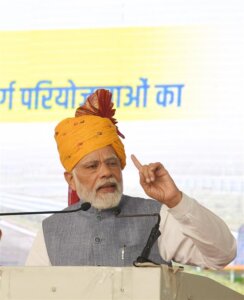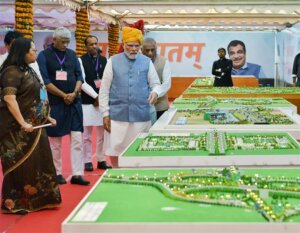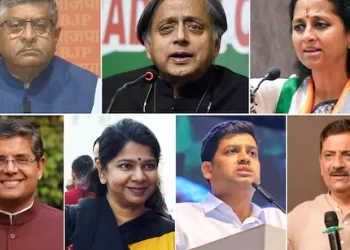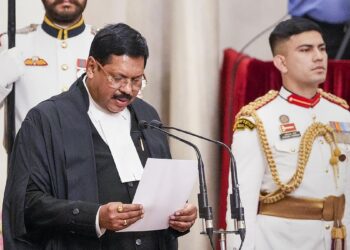The Prime Minister, Shri Narendra Modi dedicated to the nation, the 246 km Delhi – Dausa – Lalsot section of the Delhi Mumbai Expressway today. He also laid the foundation stone for 247 kilometres of National Highway projects to be developed at a cost of more than Rs 5940 crore. The Prime Minister’s emphasis on the building of excellent road infrastructure as an engine of growth, development and connectivity in New India is being realised by the construction of a number of ongoing world-class Expressways across the country.

Addressing the gathering, the Prime Minister expressed pride in dedicating the first phase of the Delhi-Mumbai Expressway to the nation. He underlined that this is one of the most advanced expressways in the world which presents a grand picture of developing India.
The Prime Minister said that when such modern roads, railway stations, railway tracks, Metro and airports are constructed, the country’s development gets momentum. He also highlighted the multiplier effect of the investment on infrastructure. “For the last 9 years, the Central Government is also continuously making huge investments in infrastructure”, the Prime Minister remarked as he noted investments worth more than 50,000 crores for the construction of highways in Rajasthan. In this year’s budget, the Prime Minister informed that there has been an allocation of 10 lakh crores for infrastructure which is 5 times more than the allocation in 2014. He underlined that the poor and middle class from Rajasthan will greatly benefit from these investments. The Prime Minister underscored the benefits of investment in infrastructure on the economy and said that it creates employment and connectivity

The Prime Minister stated that when investments are made in highways, railways, ports, airports, optical fibers, digital connectivity, construction of pucca houses and colleges, every section of the society gets empowered.
Elaborating on another benefit of infrastructure, the Prime Minister said that economic activities are getting a boost. He said with the construction of the Delhi – Dausa – Lalsot highway, the travel time between Delhi and Jaipur will be reduced. The Prime Minister said that along the Expressway Grameen Haats are being established that will help the local farmers and artisans. He underlined that the Delhi-Mumbai Expressway will benefit Rajasthan along with many areas of Delhi, Haryana, Gujarat and Maharashtra. “Tourism spots like Sariska, Keoladeo National Park, Ranthambore and Jaipur will draw huge benefits from the highway”, he said.
Speaking about the three other projects, the Prime Minister said that one of them will give Jaipur direct connectivity with the expressway. The second project will connect the expressway with Ambala- Kotputli corridor near Alwar. This will help vehicles coming from Haryana, Punjab, Himachal and Jammu Kashmir to travel to Punjab, Gujarat, Madhya Pradesh and Maharashtra. Lalsot Karoli road will also connect the region with the Expressway.
The Prime Minister underlined that the Delhi-Mumbai Expressway and the Western Dedicated Freight Corridor are going to become two strong pillars of progress for Rajasthan and the country and will transform this entire region including Rajasthan in the times to come. He noted that these two projects will strengthen the Mumbai-Delhi Economic Corridor and the road and freight corridor will connect many regions of Rajasthan, Haryana and Western India with ports. He said that it will create new opportunities for logistics, storage, transport and other industries as well.
Highlighting that the Delhi Mumbai Expressway is powered by the PM Gati Shakti Masterplan, the Prime Minister informed that arrangements have been made to lay optical fiber, electricity lines and gas pipelines, and the leftover land will be used for producing solar energy as well as warehousing purposes. “These efforts will save the nation a lot of money in the future”, the Prime Minister remarked.
Concluding the address, the Prime Minister highlighted the mantra of ‘Sabka Saath, Sabka Vikas’ for Rajasthan and the county, and said, “The government’s resolve is to make a competent, capable and prosperous India.”
Union Minister for Road, Transport and Highways, Shri Nitin Gadkari, Union Minister for Jal Shakti, Shri Gajendra Singh Shekhawat, Union Minister of State for Agriculture and Farmers’ Welfare, Shri Kailash Choudary, PWD Minister of Rajasthan Government, Shri Bhajanlal Jatav and Members of Parliament were present on the occasion among others.
Background
The 246 km Delhi – Dausa – Lalsot section of the Delhi Mumbai Expressway has been developed at a cost of more than Rs 12,150 crore. This operationalization of this section will reduce the travel time from Delhi to Jaipur from 5 hours to around 3.5 hours and provide a major boost to the economic development of the entire region.
Delhi Mumbai Expressway will be India’s longest expressway with a length of 1,386 km. It will reduce the travel distance between Delhi and Mumbai by 12% from 1,424 km to 1,242 Km and travel time will be reduced by 50% from 24 hrs to 12 hrs. It will pass through six states – Delhi, Haryana, Rajasthan, Madhya Pradesh, Gujarat and Maharashtra and connect major cities like Kota, Indore, Jaipur, Bhopal, Vadodara and Surat. The Expressway will also serve 93 PM Gati Shakti Economic Nodes, 13 Ports, 8 Major Airports and 8 multi-modal logistics parks (MMLPs) along with spurs to new upcoming greenfield airports such as Jewar Airport, Navi Mumbai Airport and JNPT port. The Expressway will have a catalytic impact on the developmental trajectory of all adjoining regions, thus contributing in a major way to the economic transformation of the country.
During the programme, the Prime Minister also laid the foundation stone of 247 kilometres of National Highway projects to be developed at a cost of more than Rs 5940 crore. This includes a 67-km long four-lane spur road from Bandikui to Jaipur to be developed at a cost of more than Rs 2000 crore, a six-lane spur road from Kotputli to Baraodaneo, to be developed at a cost of about Rs 3775 crore and two-lane paved shoulder of Lalsot – Karoli section, being developed at a cost of about Rs 150 crore
Source:PIB







 Finance
Finance







